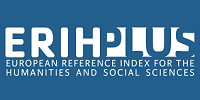Archives
-
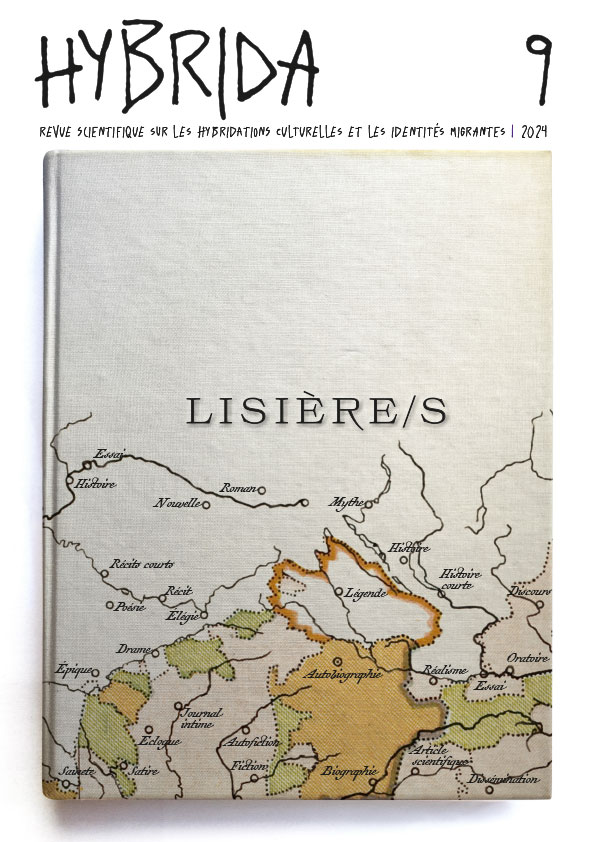
LISIÈRE/S
No. 9 (2024)The ninth issue of HYBRIDA is especially dense and interesting. The Dossier entitled ‘LISIÈRE/S’, carefully coordinated by Estel Aguilar Miró, Josep Marqués Meseguer and Marina Hernández Royo of the University of Zaragoza, who have done a brilliant job of editing and written a fine introduction presenting the ecopoetic and geocritical approaches, as well as the concept of transgression in the broadest sense, is made up of six research articles, including one from the Ivory Coast, two from Spain, two from France and one from Switzerland. Bertrand Wespthal, drawing on authors such as María Zambrano and Michel Tournier, has written an excellent ‘theoretical’ article on the notion of the ‘edge’, using the metaphor of the ‘ajar door’ and opening the door to intercultural dialogue. The works of Emmanuel Carrère, Violette Leduc, Pauline Delabroy-Allard and Léonora Miano are also examined from the perspective of migration studies, gender studies, feminist studies and ecological studies. The life of the painter Caravaggio in contemporary fiction will also be explored in an original way. In the Mosaic section, we are publishing an article from Cameroon on cultural hybridity and multilingualism in the work of Djaïli Amadou Amal. In the Traces section, we publish ‘Silence in the Darkness’, containing a short explanatory text and photographs by Alexandre Melay exploring the marginal ‘natural’ spaces of the urban periphery.
-
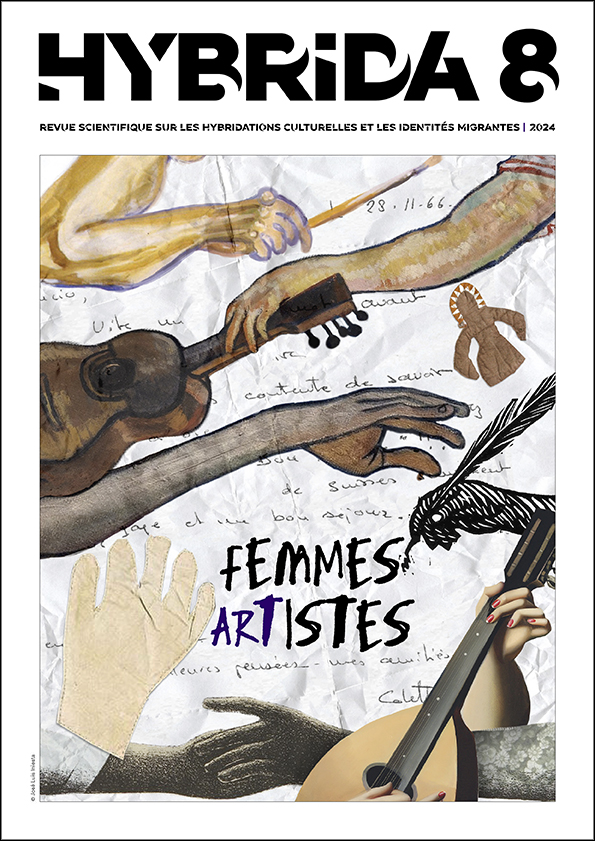
FEMMES ARTISTES
No. 8The eighth issue of HYBRIDA is especially rich and varied. The central dossier, entitled 'FEMMES ARTISTES', was coordinated by Claudia Pena López of the University of Valladolid (Spain), whose introduction bears witness to her commitment and expertise. It is made up of four profusely illustrated research articles from Spain and the Congo that attempt to recover and make visible the figures and works of two women artists whom history has unjustly forgotten: the painter Lita Besnard and the sculptor Camille Claudel. The theories and writings of Monique Wittig are also highlighted in another highly evocative article. A study of the presence of women artists in the novels of Congolese writer Henri Lopes completes the panorama. In the Mosaic section, we are publishing two articles from France and Morocco. The first looks at the work of Argentinian author José Sbarra in dialogue with the thinking of Virginie Despentes, and the second offers an empirical study of dyslexia in Moroccan children. In the Traces section, we are publishing four particularly interesting texts: an interview with the prestigious Quebec playwright Carole Fréchette, an autofictional account of the invisibility of women artists and the violence to which they are subjected, a 'short story' paying tribute to the unjustly forgotten writer Henriette Valet, and a micro-story of creation full of mystery. Happy reading!
-

MASCULINITIES
No. 7The seventh issue of HYBRIDA clearly demonstrates the process of internationalisation that is at the basis of the creation of the journal. We offer eight research articles, one creative text and one review from Africa (Ivory Coast, Guinea and Tunisia), the Americas (Brazil, Canada (Quebec) and the United States) and Europe (Spain, France and Romania). The MASCULINITÉ/S Dossier, masterfully coordinated by Ralph Heyndels of the University of Miami, is composed of four articles on the works of the writers Abdellah Taïa, Daniel Van Oosterwyck and Paul B. Preciado; playwright Roland Topor; and filmmakers Nabil Ayouch, José Juan Bigas Luna and Nelly Kaplan. The Mosaic section presents four articles that adopt perspectives from comparative, ecopoetic, gender, postcolonial and subaltern studies to analyse the works of writers from all horizons: Jean-Marie Adiaffi, Aïssatou Diamanka-Besland, Mohamed Alioum Fantouré, Flore Hazoumé, Abdelaziz Kacem and María Reimóndez. In the section Traces, we publish an unpublished text by the Québec writer Monique Proulx, who reflects on her own writing process. In the section Fan we present a review of a collective volume dedicated to the work of Mohammed Dib.
-
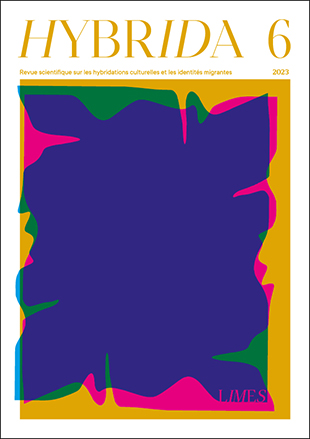
LIMES
No. 6The sixth issue of HYBRIDA contains the LIMES Dossier, coordinated by Anna Ledwina and Michal Wanke from the University of Opole (Poland). We have succeeded in building solid bridges between different disciplines in the humanities and social sciences. There are seven articles in French from Africa (Burundi, Cameroon and Morocco) and Europe (France and Portugal). They deal with authors who share identity, social and aesthetic issues around the concept of "border" or "limit": Mario Pasa, Abdellah Taïa, David Van Reybrouck, Marie NDiaye, Fatima Mernissi, Hélène Bessette, Giannina Braschi, Mohamed Mbougar Sarr and Mahmud Nasimi. In the Dossier, there is a special section called Other perspectives, in which we include four articles in English from Latvia, Poland and the Czech Republic dealing with cultural and social studies outside the French-speaking context. In the Mosaic section, we publish two articles from Spain and Morocco analysing hybrid forms in literary journalism and the representation of women in the aphorisms of Abdelmajid Benjelloun.
-
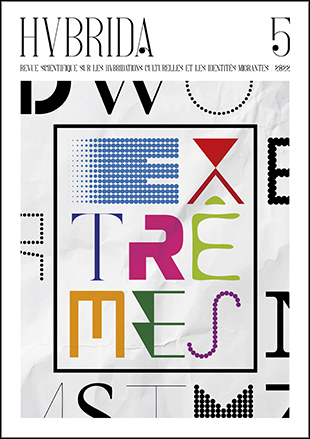
EXTRÊME/S
No. 5(12/2022)The fifth issue of the journal HYBRIDA contains the Dossier EXTRÊME/S, coordinated by Fabio Libasci. It is composed of four articles from Côte d'Ivoire, Finland and France. They deal with the work of writers Azo Vauguy, Koffi Kwahulé and Hélène Cixous; and film-makers interested in the Chinatown district of Paris. In the Mosaic section, we also publish four very interesting articles from Morocco and Spain. They deal with the historical figure of Mostafa Al-Azemmouri or Estevanico, the dichotomy of integration/integrity in the work of Fouad Laroui, the 'Batouala affair' (Prix Goncourt 1921) and the hybridisations of the animal-woman in Boris Vian. In the Traces section, we publish three contributions: the fragmentary narrative restos de barrios by Lula Carballo, the photographic document [TIMESCAPES] by Alexandre Melay and a rich interview with the writer Laura Alcoba. We inaugurate the Fan section with a full review of the essay Planète en ébullition. Écologie, féminisme et responsabilité by Laurence Hansen-Løve.
-
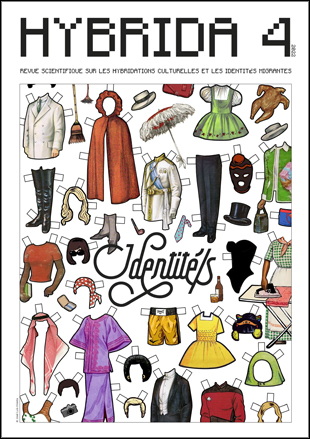
IDENTITÉ/S
No. 4(06/2022)The fourth issue of the HYBRIDA magazine contains the Dossier IDENTITIE/S, coordinated by Walter Romero from the University of Buenos Aires. It brings together ten articles that come from different cultural spaces that enter into communication with each other: Ivory Coast, Spain, France, Morocco, Tunisia... They address and study such different authors, and ultimately so close to the proposed theme, such as Tahar Ben Jelloun, Fatima Daas, Alexandra David-Neel, Ariane Dreyfus, Carlos Fuentes, Édouard Glissant, Patrick Grainville, Laura Kasischke, Milan Kundera and Achille Mbembe, as well as other audiovisual productions. In the Mosaic section we publish two very interesting articles on the presence of sexuality in North African literature and on the universe of digital books. In the Traces section we have the honor of publishing for the first time an unpublished text by the writer Tassadit Imache. With the title of "Black Shadows" we also publish a heart touching testimony of the artist Alex Medina.
-

AID/S – 40 years
No. 3(12/2021)The third issue of the journal HYBRIDA contains the Dossier SIDA / S – 40 ANS (SIDA/S – 40 YEARS), coordinated by Ahmed Haderbache and Didier Lestrade. It is composed of seven international research articles that start from the sociological and political fact to address literary production, including film, theatrical and artistic analysis. In the Mosaïque (Mosaic) section, we publish three international articles on travel, miscegenation and cultural hybridizations between France and Africa. In the Traces section, devoted to creative writing, we have the honour of publishing a short story by Quebec writer Catherine Mavrikakis, as well as two “testimonials” by David Caron and Lydia Vázquez. We also publish Javier Sanz’s unpublished piece titled Reset. Volver a empezar (Reset. Start all over again). In Annex, to commemorate the 25 years of the volume Sida y Cultura (Aids and Culture), coordinated by Ahmed Haderbache and Ana Monleón, we publish a faithful reissue to the first edition.
-
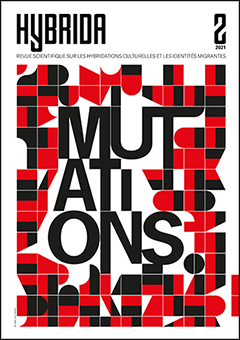
MUTATIONS
No. 2(06/2021)The second issue of the journal HYBRIDA includes the monograph MUTATIONS, coordinated by Anikó Ádám from the Pázmány Péter Catholic University (Hungary). It brings together seven articles from Universities in Austria, Belgium, Ivory Coast, the United States, France, Luxembourg and Morocco. It combines cultural approaches and literary analysis approaches around this shifting and versatile notion, from a generic and thematic point of view. We have created the MOSAIC section to publish other articles of a more general nature (we have three in this issue) on cultural hybridizations and migrant identities. We also inaugurated a section for literary creation called TRACES with a previously unpublished short story by Canadian author Lori Saint-Martin.
-
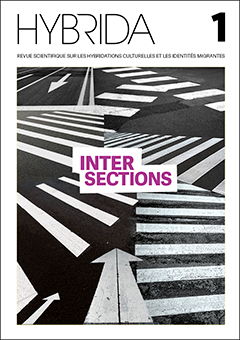
INTERSECTIONS
No. 1(12/2020)This first issue of the HYBRIDA magazine, coordinated by Inmaculada Tamarit Vallés of the Polytechnic University of Valencia, is dedicated to the idea of INTERSECTION, which seems essential as a starting point. It brings together eight research articles from nine university students, from Spain, France and Lebanon, who have generously contributed to launch this project.











